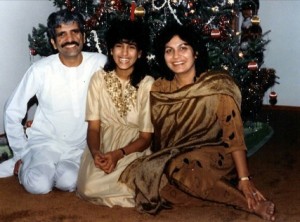By Anjum Choudhry Nayyar
When Soania Mathur found out she had Parkinson’s Disease, she was carrying her first child and just 27-years-old. As a young mother-to-be and a physician herself, she focused only on the well being of her child at the time and not on the deteriorating state of her health.
Now a mother of three daughters, aged 14, 12 and 8, she says her biggest challenge back then was trying to find ways to help her children understand her diagnosis and making sure they were never afraid. Parkinson’s Disease is a disorder of the brain that leads to shaking or tremors and difficulty with walking, movement, and coordination.
It is a chronic, degenerative neurological disorder that affects one in 100 people over age 60. While the average age at onset is 60, approximately 10% of cases can occur under the age of 45, some as young as 18. A diagnosis such as this affects whole family units, including most significantly, the children. Parents that are struggling with their diagnosis often have trouble dealing with the idea that their parental role may now have to adapt given the change in their health. While most moms with a new diagnosis of Parkinson’s would perhaps shut down or become depressed, Mathur made it her mission to ensure her daughters were never afraid and she herself made it a priority to be present as a mom as much as possible.
“In my situation, Parkinson’s has always been a part of my daughters’ lives. It was definitely challenging though when I was pregnant with each child because at that time or when I was breastfeeding, I couldn’t take my medication and so the symptoms were really bothersome. It was challenging when I had to do the normal things like feeding, bathing or changing them when they were squirming. Not that it would stop me from doing it; I wouldn’t let it. It would just take me a lot longer to get through a task that would take other moms less time to get through. It was challenging from a physical point of view. As they grew older, Parkinson’s became the norm. For them I’ve always had shaky hands and I’ve had to take medication and sometimes I need to wait before I can do an activity. Sometimes I can colour in the lines with them sometimes not so much, sometimes I can paint their nails, other times they’re better off waiting. That’s just a part of life and we don’t dwell on the negative. They always knew what my issues were but we just hadn’t put a label on it.”
She says being South Asian also made disclosing the diagnosis difficult.
“I think being South Asian did play a role in what I disclosed to my parents. I didn’t tell them for a long time because I’m an only child and my parents, like many Indian parents, are extremely overprotective. I didn’t’ disclose it to them for many years because of the fear it would devastate them. I think some of it is a fear of what other people will say. In general there’s a lack of understanding in the Indian community, that somehow your illness is a defect. My parents however, were absolutely wonderful when they found out and very supportive.”
Mathur admits it was emotional for her when she did find out she had Parkinson’s but she didn’t have time to deal with her diagnosis because she became a busy mom of three along with running a busy family practice. She says by the time she had her third child she really wanted a resource to help educate her children about her diagnosis.
“I wanted to find resources to help educate my girls in a more formal way about Parkinson’s. I started looking for little stories to help Meeraya, my youngest understand the challenge I was facing and also to reassure her. There wasn’t anything I could find anywhere.”
Mathur says giving her children control of the situation was a priority. She adds she and her husband Arun always encouraged their daughters to give part of their allowance to charity as a way to foster empathy and compassion. Over the years, they also took on fundraising and charity events with The Michael J. Fox Foundation for Parkinson’s Research and it was that activity that started the dialog.
“We were talking about the fact that we had just gotten back from one of the charity events in New York with the Michael J. Fox Foundation and we asked them, “So do you know why we attend all these Parkinson’s events? My oldest had no clue, but my 10-year-old Neha, said, “Because you have Parkinson’s.” which floored us, because we never discussed it. But she’s so intuitive and I guess she put two and two together. Then they all said “Mom, we’re going to start giving our allowance to The Michael J. Fox Foundation for Research because we want you to be better.” Then we hugged and it was a really amazing moment.”
Mathur says her diagnosis has become a learning opportunity for her family and for her children.
“My daughters have learned a lot of empathy, compassion, charity and kindness through this process. We didn’t really label it as Parkinson’s up until two years ago. When toddlers fall, they look to you for your reaction. If you freak out, they cry. If you take things calmly, they pick themselves up and walk on. So we took a similar approach in dealing with my diagnosis. We wanted to take a very matter a fact approach so it wouldn’t stress them. We didn’t want to add to their pressure. They‘re having enough pressure navigating the world, dealing with peer groups, school etc. It’s a lot for a child to handle especially when it’s something that’s not within their control. My diagnosis taught them that they’re going to have challenges in their lives, and how they approach those challenges is going to determine the kind of women they’ll become.”
But for Mathur the education didn’t stop there. Her experience with her children inspired her to want to help other moms who were struggling like her to find resources to educate their children. She decided to write children’s books for both preschoolers and older children.
“I’ve always loved children’s books. I have a house full of them. My husband Arun really encouraged me to pursue it. My dad also did a lot of writing for children and he was very encouraging as well.”
The goal was to write the books in a way that would address some of her own experiences and her daughters’ challenges when it came to Parkinson’s. She’s currently written two for preschoolers already. They are in the illustration phase and one other for older children is almost complete.
“My two older daughters Neha and Sarika have helped me through this process and the youngest provides inspiration,” says Mathur.
“One story is about a grandfather and his grandson and is specific to the experience of Parkinson’s. The other is about a mother and her daughter. The mother-daughter one can be used for any mother who has a chronic illness as a point of teaching for them. The one I am currently completing, a guide for older children, is much more about the physiology of Parkinson’s: Why people shake, what the medications do to you, how the child can cope with the diagnosis and what to do when the child is scared. The children’s guide was a result of when I disclosed my diagnosis to the older girls because I wanted to find a project that we could work on together to help them understand a bit more detail on what Parkinson’s was all about, rather than mama just had the shakes. It’s been almost therapeutic in that way to work on it together. My daughters are helping to write boxes of information throughout the book with them talking about how my situation affected them.”
Mathur says she believes that parents in similar situations need to be sensitive in how they communicate a diagnosis like Parkinson’s or any other illness, to their children.
She has these tips for parents:
1) Be honest in your disclosure because children are extremely intuitive. The stories they make up in their head are probably much worse than what the reality is. It can make a child more uncomfortable if they know a parent is hiding something from them. Take into consideration their age and maturity level when deciding what information to give them.
2) Use words that are directed towards their education level. Try to limit the complexity of your explanations but do try and educate them about some of the more common technical terms.
3) Always express hope. Every situation has a positive perspective. Children are remarkably resilient and their perspective is usually far more optimistic than our own. Honor that optimism and outlook.
4) Empower them by giving them concrete ways to help out, be it with daily tasks such as housework or more proactive activities such as fundraising. Otherwise they can feel helpless in what is in reality, an uncontrollable situation for them.
For Mathur, her hope, inspiration and her family keep her strong and drive her to want to help others especially parents with similar challenges.
“Before my Parkinson’s diagnosis my daily mantra was ‘don’t pray for an easy life, pray to be a strong person. That’s what I often say to myself when I’m having a bad day.”
Soania is involved with the Parkinson’s Society of Canada as a speaker at patient-directed conferences and as a resource for some of their education projects. She also currently works with The Michael J. Fox foundation for Parkinson’s Research (www.michaeljfox.org) and serves on their Patient Council. She is also involved as an advisor for The Brian Grant Foundation (www.briangrant.org or www.shakeittillwemakeit.com) and is helping them in the development of a comprehensive website, a resource for newly diagnosed patients, caregivers and family members including children. The launch date is set for later this summer (www.poweringforward.org). For more information, please visit www.designingacure.com.









YAY MAMA!!!!!!!!!!! 🙂
I agree with Sarika! Yay Soania! What wonderful role model to her children and an inspiration to all of us.
This is so inspiring, and I could not help myself getting emotional reading this article. Thanks for sharing.
We’re so glad you liked Soania’s story. She really is inspiring.
Proud of my amazing, inspirational and devoted bhabhi!
[…] life.” In the article, Soania discusses her journey as a parent with Parkinson’s. Click here to read her inspirational […]
Hoorah! Seeing other young onset patient/parents always helps me to stay on the path of Powering it forward.